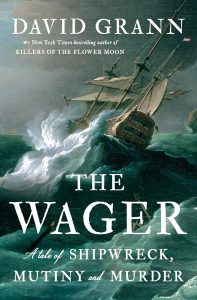“The Wager” came out just as I was finishing Grann’s previous book, “Killers of the Flower Moon” (2017), a magnificent account of murder in pursuit of oil money within the Osage Indian territory, but only now have I gotten around to reading it.

Extensively reported by Grann from contemporaneous documents and written in his adventurous narrative style (journalism meets Hollywood), “The Wager” follows an ill-fated armada of British warships that leave England in 1740 bound for the west coast of South America with the intent of capturing a Spanish galleon laden with gold.
The ferocity of the Southern Ocean punishes the ships and their crews as they attempt to round Cape Horn on the tip of the continent. Disease plagues the men as the winds and currents hold them captive. They die by the dozens. Some ships turn back, a couple continue, one of which, the HMS Wager, runs aground on a barren island jutting from the Chilean coast. From there, life for the survivors gets even worse. It is revealing nothing to say mutiny and murder ensue (as promised on the book’s cover).
Your fascination with such a true story will depend on your taste for seafaring tales. Mine is relatively high (I was such a teenage fan of the “Mutiny on the Bounty” trilogy that I read it twice). I will say that the latter third of the book, which deals with the consequences of what happened on that forsaken island, suffers in comparison to the whiplashing action of what comes before, but Grann wraps it up nicely. And the ending reminds that little has changed in politics and government in the last two centuries. As a whole, the story and the telling do not disappoint.
***
If fun is to be found amid such a bleak happenings, it is within the colorful language of the those 18th century mariners and how some of it still enlivens modern English. For example:
- The names of diseases: the Saffron Scourge (Yellow Fever), the Bloody Flux (Dysentery), Breakbone Fever (Dengue).
- “A ship was ‘three sheets to the wind’ when the lines to the sails broke and the vessel pitched drunkenly out of control.”
- “When ailing seamen were shielded belowdecks from the adverse elements outside, they were said to be ‘under the weather.’”
- “To ‘turn a blind eye’ became a popular expression after Vice-Admiral Nelson deliberately placed his telescope against his blind eye to ignore his superior’s signal flag to retreat.”
